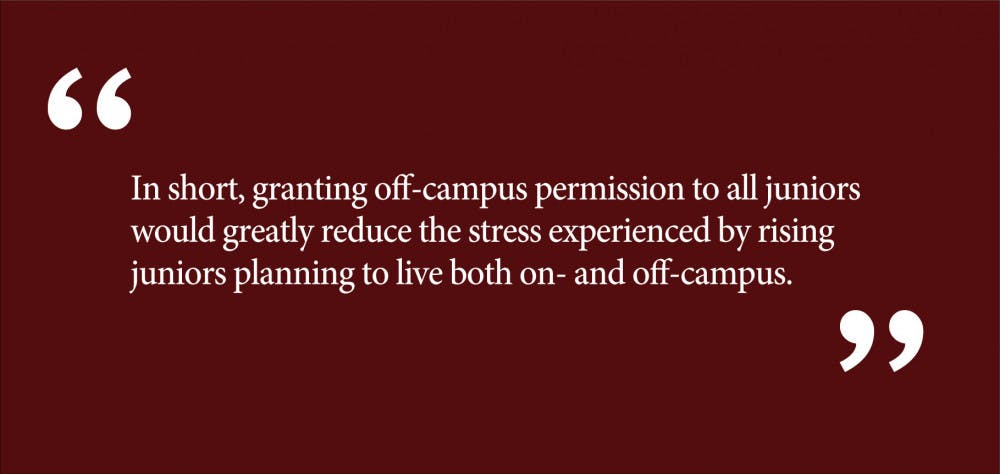Complaints about off-campus permissions for rising juniors aren’t new. For example, in 2017, The Herald reported that many students thought the process was a hassle and faced pressure from landlords to sign leases before receiving permission to live off campus. Ultimately, this frustrating process leaves some students locked “into a lease” and “also responsible for living on campus,” according to Kate Tompkins, former associate director of programs for the Office of Residential Life.
The fact that we need to request permission to not pay for on-campus housing — and pay a $400 fee if we do live off-campus — has always seemed slightly ridiculous. This situation reached new levels of absurdity this summer, when I realized I had friends both in the summer assignment lottery for on-campus housing — meaning they would be assigned housing and possibly placed with people outside their group because of a lack of available rooms — and in the off-campus permission appeals process. This uncertainty led to extremely stressful summer experiences for several of my close friends, as they waited to find out where they would be living this year. Granting off-campus permission to all juniors who apply would reduce the length of the summer assignment list and allow more students to secure their housing situation earlier in the year without worrying about being forced to pay for both on- and off-campus housing. In short, granting off-campus permission to all juniors would greatly reduce the stress experienced by rising juniors planning to live both on- and off-campus. (Currently, the ResLife website suggests that priority is given to rising seniors who apply for off-campus permission).
It’s unclear why Brown’s housing policy leaves some students waiting for on-campus housing and others waiting for off-campus permission: Somehow we seem to simultaneously have a surplus and shortage of on-campus housing. Is the University keeping rooms empty for transfer students? Is there a large number of mismatches between housing groups and available room configurations? I don’t know the number of students in summer assignment, but based on the number of students I personally know who waited in the lottery, it seems to be a sizable figure, too large to be explained by these factors. Any reasons that explain the current system certainly aren’t effectively communicated to students.
Some might argue that granting permission to all juniors could result in more empty rooms and lost revenue for the University. Yet no other Ivy League schools require students to live on campus after their first two years. If peer institutions can make their budgets balance without requiring some juniors to live on-campus, so can we.
Furthermore, the University shouldn’t force students to pay for housing they don’t want. Instead of forcing students to live on campus, the University should improve dorm quality and reduce the cost of room and board so students actually want to live there. The University renovated Minden Hall and the Vartan Gregorian Quad, created a lounge in Graduate Center E this past summer and plans to improve Hegeman Hall and Machado House next summer. These renovations are a good start, but more work is still needed to make living on campus an attractive option for upperclassmen.
While the University thoughtfully designs academic policies to limit unnecessary stress in students’ lives, this logic seemingly does not apply to University housing policy, as the current system clearly creates a great deal of stress and uncertainty. If the University truly cares about student well-being, they should consider allowing all juniors who apply to live off-campus.
Rebecca Aman ’20 can be reached at rebecca_aman@brown.edu. Please send responses to this opinion to letters@browndailyherald.com and op-eds to opinions@browndailyherald.com.





